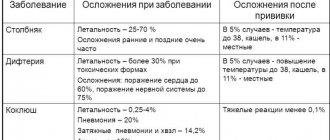Whether or not to vaccinate children against flu is up to each parent to decide individually. The topic of vaccination is constantly debated both in scientific circles and among ordinary people.
Some people believe that the flu vaccine is mandatory for children.
Proponents of the opposite opinion believe that vaccination is an artificial intervention in the immune system and harms the baby’s body. In this material we will try to understand in detail the question - should a child get a flu vaccine?
What is seasonal flu and is it dangerous?
Seasonal influenza is an infectious disease caused by a small enveloped virus. It occurs with primary damage to the respiratory system. After illness, a person develops immunity, but it cannot protect him from all the flu viruses on the planet.
The virus is covered with a shell, inside which contains fragmented RNA - the carrier of genetic information. “Data reading” and protein synthesis are carried out from each “piece” separately. This is the reason for the variability of the virus.
Various protein-carbohydrate complexes are present on the surface of the shell. Two compounds play the greatest importance in the development of the infectious process and the formation of immunity - hemagglutinin and neuraminidase.
Hemagglutinin is a substance that finds receptors on host cells and attaches to them. There are 18 known subtypes of this antigen. Neuraminidase performs two functions: it helps the virus penetrate the epithelial cells of the respiratory tract, dissolving the protective mucous barrier, and “releases” new copies of the pathogen from the host cells, thereby facilitating its spread in the body. Scientists say there are 11 subtypes of neurominidase.
After the meeting, the human body produces antibodies to these antigens, which protect against recurrent disease.
There are 4 types of virus: A, B, C, D. The first two types cause diseases in humans. Influenza A is the most numerous, its representatives cause epidemics and pandemics. The most well-known and relevant representatives: H3N2 and H1N1. Influenza type B is divided into 2 lines - Yamagata and Victoria. Immunity after illness develops only to the strain that caused the infection and lasts up to 3 years for influenza type A and up to 6 years for influenza type B.
Symptoms and complications of influenza in children
The typical clinical picture is characterized by severe intoxication and catarrhal symptoms in the upper respiratory tract. The disease develops acutely, the temperature quickly reaches 38-40 degrees, complaints appear about:
- weakness;
- chills;
- headache;
- joint and muscle pain;
- cough; runny nose;
- nausea, vomiting;
- lack of appetite.
Severe intoxication leads to the fact that the child literally does not get out of bed and sweats profusely. Infants refuse to breastfeed and spit up profusely. There may be disturbances in sleep and wakefulness - excessive drowsiness or agitation. Immaturity of the nervous system leads to the development of febrile seizures.
The influenza virus not only affects the epithelium of the respiratory system. It disrupts microcirculation in the lungs and brain. A number of children develop viral pneumonia and swelling of the brain with symptoms resembling meningitis.
A lightning-fast course is possible, in which the child’s condition begins to deteriorate “before our eyes”, requiring urgent hospitalization in a hospital. The famous pediatrician E. O. Komarovsky, speaking about the need to prevent the disease, emphasized that for children under 6 years of age, influenza is considered one of the most dangerous diseases. The most severe complication in this group is considered to be viral encephalitis. This disease can cause disability or death of the baby.
But other complications also pose a danger to babies and older children. When doubting whether their child should be vaccinated against the flu, parents do not always imagine what a “banal acute respiratory infection” could turn out to be. The most common complications include:
- viral or viral-bacterial pneumonia;
- otitis;
- sinusitis;
- myocarditis;
- meningitis;
- laryngotracheitis with the development of false croup;
- rheumatoid arthritis.
Is vaccination dangerous after illness?
Immunologists around the world insist that only healthy babies without signs of any disease should be vaccinated.
But what to do if the child had a viral infection several days before the vaccination? Is it worth vaccinating such a baby immediately after illness? After an illness, children who do not have symptoms of the disease can be immunized.
Such small patients should feel well; upon examination they do not have fever or any catarrhal manifestations. A few days after recovery, the child can be vaccinated, but it is better to take a blood test first and make sure there are no residual effects of the infection.
Why vaccination should be done every year
The flu shot helps produce antibodies against virus antigens. Their synthesis is associated with blood cells - B-lymphocytes. The lifespan of populations ready to protect the body from the virus does not exceed 3-6 years. But it often turns out that after 1-2 years, the antibodies produced at the cost of the disease do not work. Why, do they change somehow?
No, flu antibodies in the human body remain the same. This “cunning” virus, mutating, updates its antigenic composition and becomes “too tough” for the human immune system. Therefore, international influenza research centers monitor cases of the disease all year round and analyze strains isolated from people. Based on the information received, WHO experts in the spring of each year name all current variants of the pathogen and write recommendations on the composition of the vaccine for the season.
Rospotrebnadzor warns that the vaccine protects the child from 6 to 12 months and indicates that this period depends on the vaccine itself.
Which flu vaccine is best tolerated by a child?
When choosing a seasonal flu vaccine, parents are looking for a drug that is easily tolerated, does not cause allergic reactions, and actually protects the child from the disease.
There are 4 groups of vaccines registered in the Russian Federation:
- Whole virion. Vaccines contain not destroyed, but neutralized influenza viruses. They are effective and approved for immunization of children over 3 years of age. However, the drugs have not been widely used due to the high risk of allergic reactions.
- Split vaccines. Contains internal and envelope influenza antigens.
- Subunit. Vaccine components: hemagglutinin, neuraminidase.
- Virosomal. It contains unique formations that replicate the influenza virus, with active components - surface proteins, lipids and antigens. The drug is recognized as effective and safe, but is not yet used for mass vaccination.
Protein molecules are “responsible” for allergic reactions: the larger their size, the higher the likelihood that the child will have such an undesirable reaction. Therefore, only subunit or split vaccines are used in pediatric practice.
How to choose the right time for vaccination
WHO experts warn that the incidence of seasonal flu begins to increase as the average daily air temperature drops to 3-5 degrees. At the same time, children are already going to school and preschool institutions after the summer holidays. Dry indoor air and crowded conditions create favorable conditions for the spread of the virus.
This means that by October children should be “prepared” for the new season. According to clinical studies, immunity after vaccination is formed within 2-4 weeks. Therefore, the first half of September is considered the optimal time for flu vaccination at school or kindergarten.
For children under 3 years of age, the vaccine is administered twice, using half the dose each time. The interval between vaccinations should be at least 28 days. You can start as early as August.
When answering the question at what age is it permissible to vaccinate a child, pediatricians recommend carrying out the first scheduled vaccination before the age of one year - from 6 months. Detailed information about restrictions is contained in the instructions for the drug.
Sometimes the annual flu vaccination overlaps with other routine vaccinations. Subunit and split preparations can be administered on the same day as other inactivated vaccines. For example, pediatricians advise combining a flu shot with a pneumococcal or Hib vaccine. This measure helps protect the baby: in their reviews, parents say that thanks to a set of vaccinations, the child has actually become less likely to get ARVI, the diseases are easier and without serious complications.
Indications for the vaccine
WHO recommends mandatory influenza vaccination for the following categories of the population:
- Small children (allowed from six months of age);
- Pregnant women;
- People over 65 years old.
- Patients with chronic diseases (diabetes mellitus, bronchial asthma, adenoids, heart diseases, blood pathologies, immunodeficiencies, etc.).
These groups of people, as a rule, have a hard time suffering from the flu. They are more likely to develop complications. In addition, in people suffering from chronic pathologies, influenza can aggravate the course of the underlying disease. It is also advisable for individuals to get vaccinated in order to protect themselves and their loved ones as much as possible.
Timely vaccination of children prevents the spread of the virus in children's groups and minimizes possible complications. Vaccination will be especially effective if at least half of the children in the group are vaccinated. This will provide not only individual protection, but also general immunity.
It is strongly recommended that children who:
- They suffer from frequent colds.
- They suffer from asthma.
- They suffer from heart defects.
- Have metabolic disorders (for example, diabetes mellitus).
- They are taking therapy with drugs that suppress the immune system.
- They suffer from blood, liver and kidney diseases.
In addition, the following should be vaccinated against influenza annually:
- School students;
- Students;
- Doctors;
- Transport workers;
- Teachers;
- Educators;
- University teachers and representatives of other similar professions.
As for the compatibility of pregnancy and vaccinations, there are myths about the dangers of such vaccination.
It is vaccination that provides the necessary protection not only to the expectant mother, but also to the fetus. If a pregnant woman gets sick with the flu (especially before 14 weeks), she is at high risk of giving birth to a child with pathologies and serious disabilities. It is recommended that breastfeeding mothers also be vaccinated. This vaccination is not dangerous for the woman and will not harm the baby.
Side effects of flu vaccines
The low reactogenicity and high safety of most modern drugs does not mean that flu vaccinations do not have any undesirable effects on the body of children. The most common symptoms include:
- swelling, swelling and redness at the injection site;
- increased fatigue, headaches;
- temperature rise to 37-38 degrees.
These symptoms can be observed for 3 days, go away on their own and do not require seeing a doctor. Allergic reactions occur rarely. They are associated with individual intolerance to the components of the drug; they cannot be predicted.
Contraindications to vaccination
The list of contraindications for children is not fundamentally different from those for adult patients. They are divided into absolute and temporary. The first group includes:
- age up to 6 months;
- allergy to chicken egg white and other components;
- pronounced individual reactions during the previous administration.
Temporary contraindications are associated with changes in the patient’s condition:
- fever;
- acute respiratory diseases;
- decompensation of chronic diseases;
- 2-4 weeks after infectious diseases.
What you need to know before getting vaccinated
Can a flu shot be considered harmful if it causes negative side effects? Such reactions can occur not only due to poor-quality vaccine, incorrect technique for administering the composition, but also due to the fault of the parents themselves, who did not ask the pediatrician about vaccination or ask him questions about the possible consequences. Parents should know and consider the following.
- At 2 years of age (up to three years), as well as for older children who are often ill, the vaccine is given twice with an interval between injections of 3 to 4 weeks.
- The production of antibodies against infection can take up to a month. It is better to vaccinate your baby in advance - from September.
- In kindergarten, immunization is justified if parents give it to all children; a child without vaccination can infect everyone.
- Children can be vaccinated at school after examination by a doctor and in the absence of contraindications.
- When vaccinating a baby, all the relatives around him must also be vaccinated, then the procedure will make sense.
- Immediately after the vaccination, the child may become ill. It is possible that after the procedure he visited crowded places with his parents where there could be carriers of the infection, or he became infected with another type of virus.
How to choose a vaccine and vaccination time: advice from pediatricians
When listing the pros and cons of various drugs, pediatricians recommend paying attention to the composition and manufacturer of the vaccines. According to WHO recommendations, vaccines that contain 15 micrograms of each strain that is relevant in a given season can be considered quite effective.
The standard volume of vaccine in an ampoule is 0.5 ml. Children under 3 years of age are vaccinated twice with a half dose. This usually happens like this: the nurse draws the required amount of the drug from the bottle, administers the recommended dose, and throws away the unused portion. Modern vaccinations have a convenient form of release for children from six months to 3 years: disposable syringe pens with a ready-made vaccine volume of 0.25 ml.
Should I worry if a child under 3 years of age is injected with a full dose of the drug? Pediatricians refer to the fact that in the national guidelines of some countries it is recommended to administer 0.5 ml to young children and that positive experience has already been accumulated. Doctors emphasize that no serious consequences were recorded. But any first administration of the vaccine occurs twice: even if the baby was first given a full dose, then after a month, according to the rules, 0.25 ml will need to be added.
Children with chronic and oncological diseases (including hematological oncology) are at risk. Pediatricians recommend vaccinating them first.
What should you do if your child missed vaccinations in kindergarten due to health reasons and the optimal time for vaccination has already been missed? Pediatricians recommend waiting 14 days after an acute illness and administering the vaccine. The flu season lasts from October to May; it is better to give the injection somewhat late than to leave the child unprotected.
Refusals to vaccinate are often due to the fact that parents “do not believe” that the vaccine offered by the doctor will actually contain the current strains of influenza. Up to 10 variants of the virus circulate in the human population every year. The vaccine is produced only for 1 season and usually “covers” 2-3 of the most common and pathogenic viruses. Therefore, parents do not have to worry that their child will be given “last year’s” vaccination or that doctors will “mistake” the antigenic composition of the new drug.
Parents are often skeptical about mass vaccinations in schools and kindergartens. They do not trust medical workers and either write a refusal to get vaccinated or go to medical institutions on their own and choose the vaccine that seems most effective to them. Pediatricians do not object to vaccination at a time when the child is truly healthy and parents can observe him before and after the administration of the drug. Doctors also warn that representatives of a minor have the right to issue a written refusal to be vaccinated. Lack of vaccination cannot be grounds for a ban on attending a school or preschool educational institution.
How effective is the flu vaccine?
Some parents avoid vaccination, citing the fact that even after vaccination, the child “catch” the virus and can get the flu up to several times during the winter. But the likelihood that your baby will actually get the flu twice in a season is low. The disease immediately after vaccination or after some time may indicate that:
- at the time of vaccine administration, the child was already infected with another ARVI pathogen (incubation period);
- the child subsequently became infected with any other virus;
- the vaccine was administered incorrectly or was stored in inappropriate conditions.
The flu vaccine does not “kill” the immune system and does not increase the likelihood of developing other acute respiratory viral infections. WHO experts note that:
- Vaccination in children under 5 years of age reduces the incidence of confirmed cases of influenza by 87%;
- in preschool children, vaccinations significantly reduce the risk of acute otitis media;
- Vaccines are well tolerated even in children under 1 year of age.
Weighing all the pros and cons of vaccinations, pediatricians agree that vaccination does not really provide a 100% guarantee that the child will not get sick, but it can reduce the risk of complications, the frequency of hospitalizations and the likelihood of infecting other family members.
How to prepare for vaccination?
Preparation for vaccination is an important stage of vaccination, on which the quality of the immunity received and the likelihood of developing complications of the procedure depend. It is important to remember that only absolutely healthy babies without acute pathologies and exacerbation of chronic ailments can be immunized.
Before the injection, the child is given a general blood and urine test to assess the patient’s health status and rule out the presence of latent forms of the inflammatory process.
Only after receiving the test results, the doctor begins to examine the baby. Before vaccination, the pediatrician conducts an objective examination of the child and gives permission to administer the vaccine.
On the day of vaccination, children are not recommended to visit crowded places, take a hot bath or spend a lot of time outside, especially if the weather is bad.











